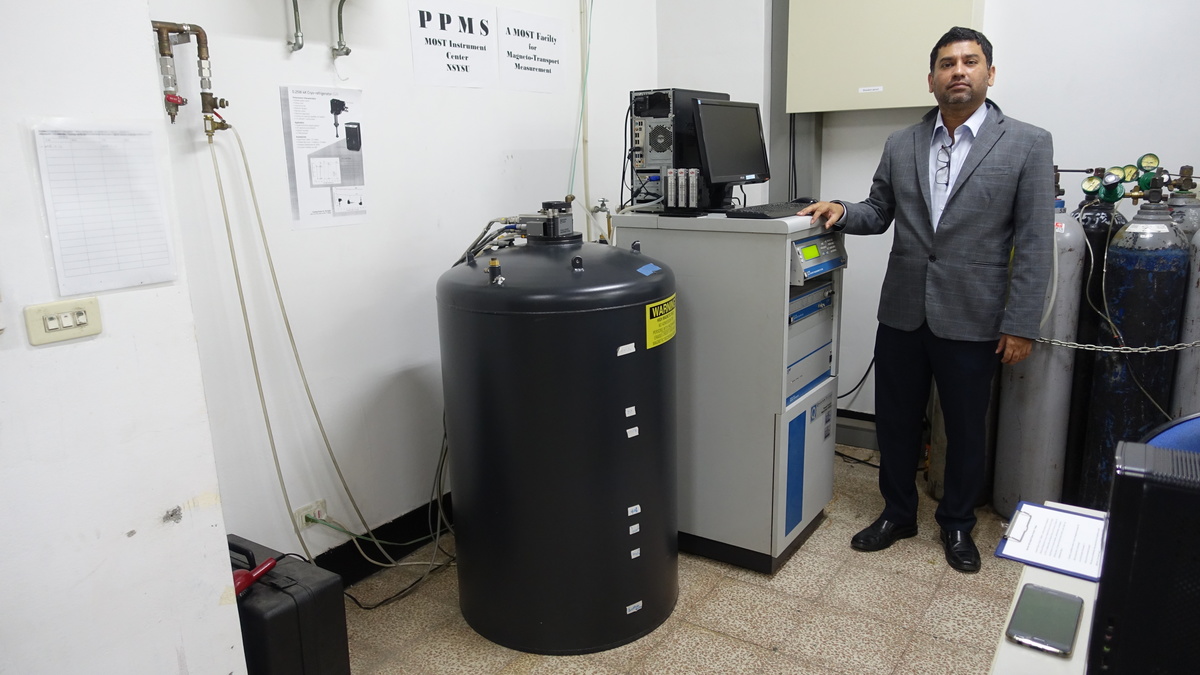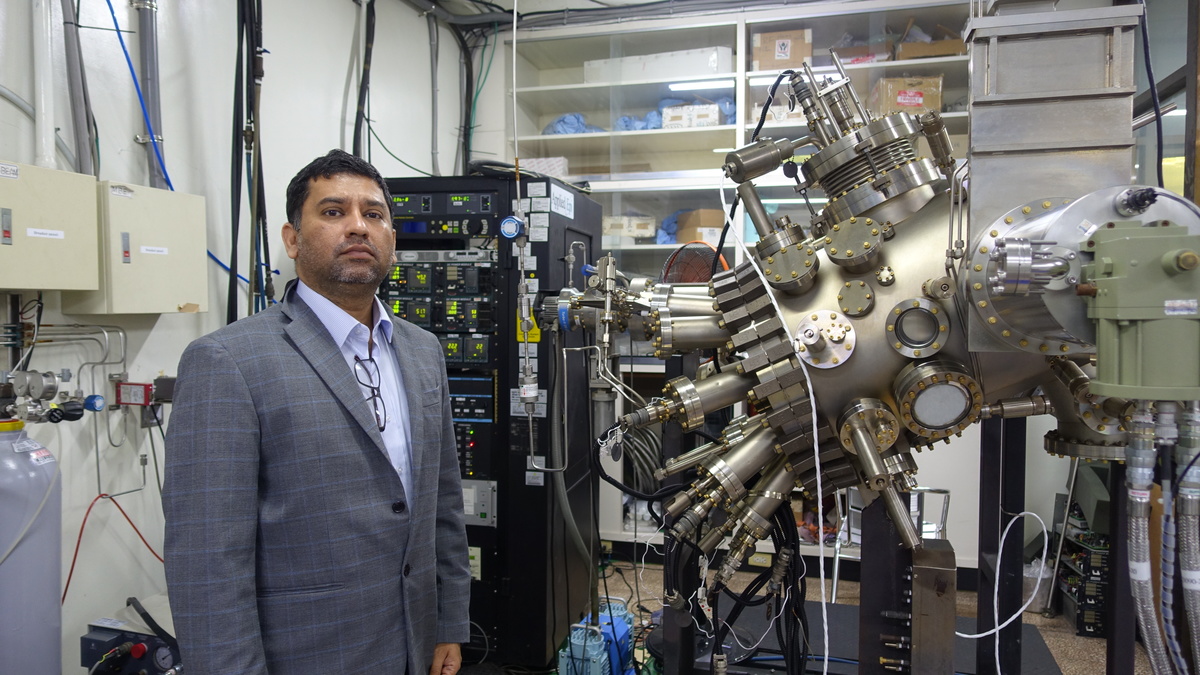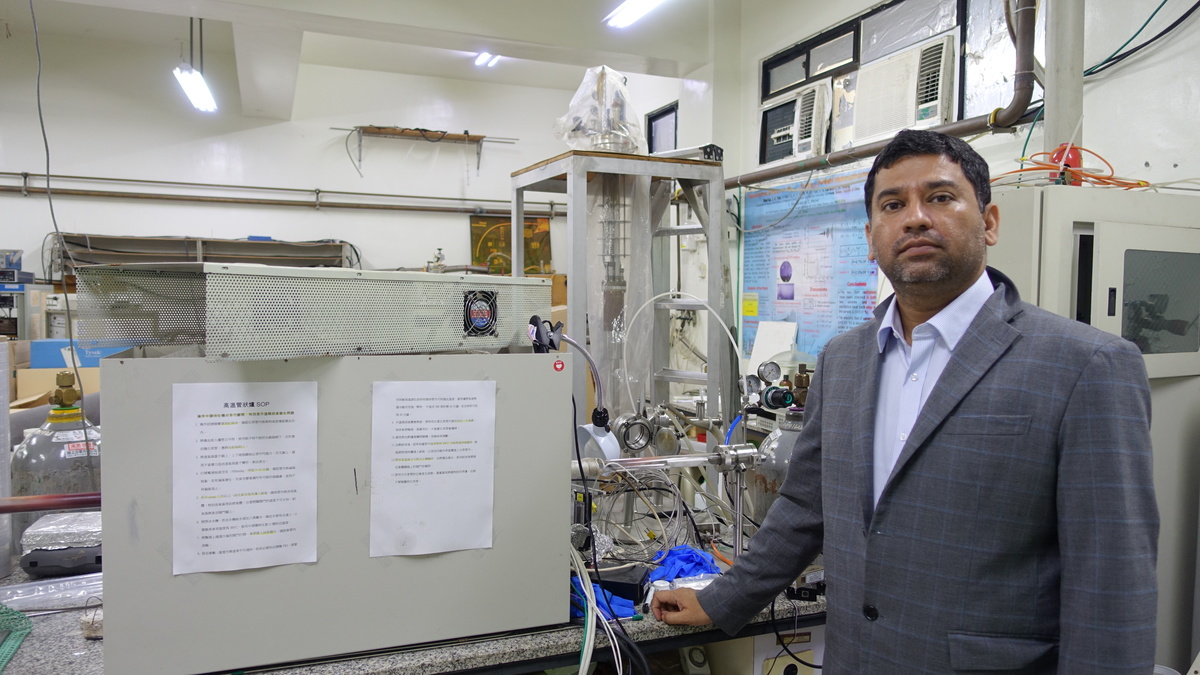The research team of Assistant Professor Wadekar makes a step forward in the development of spintronics applications by improving the properties of gallium nitride




The research team of Assistant Professor Paritosh V. Wadekar of the Department of Physics at National Sun Yat-sen University successfully improved the magnetic and electrical properties of gallium nitride by delta doping of manganese ions. This research opens new avenues for incorporating spin polarized carriers in III-nitrides based semiconductors.
In their laboratory, the team grew different diluted ferromagnetic semiconductors – materials that lie at the intersection of a ferromagnet and a semiconductor, and studied their electrical, magnetic, and optical properties. “It’s extremely rare to find synergetic co-existence of semiconducting and ferromagnetic properties in one material”, says Professor Wadekar. The team managed to significantly improve the magnetic and electrical properties of gallium nitride, a very important semiconductor for electronics and optoelectronics, by delta doping a very thin layer of manganese ions and found the anomalous Hall Effect – a signature of long range ferromagnetic ordering in such delta-doped magnetic semiconductors.
This research opens new avenues for incorporating spin polarized carriers in III-nitrides based semiconductors by creating magnetically active Mn layers in heterostructures for spintronics applications. Assistant Professor Wadekar will continue to further work on this field to extend the properties of delta-doped gallium nitride beyond room temperature. ”If successful, perhaps some potential applications would be spin-based electronic and optoelectronic devices working at or beyond room temperatures”, said Assistant Professor Wadekar.
Spintronics is a rapidly growing field aimed at realizing new high-performance devices that take advantage of the electron spin as well as of its charge. Devices based on spin currents include magnetic memory and sensors. Currently, the semiconductor devices are based on the charge of the electrons, which, however, generate heat while moving and this is detrimental to the device performance, explained Assistant Professor Wadekar. If the electrons’ spin is utilized, heat losses would be minimized. “Heat losses for semiconductor logic devices such as a transistor, based on pure spin current, would be minimal as compared to charge based devices”. Compound semiconductors doped with magnetically active transition metals are actively pursued for semiconductor spintronics.
The members of the research team included Assistant Professor Paritosh Vilas Wadekar, Professor Quark Yung-Sung Chen, Distinguished Professor Li-Wei Tu, Assistant Professor Cheng-Maw Cheng, Ph.D. student Che-Min Lin of the Department of Physics, National Sun Yat-sen University, Research Engineer in EpiStar Corporation Yuan-Ting Lin, postdoctoral researcher in Academia Sinica Ching-Wen Chang, and Professor Tsan-Chuen Leung of the Department of Physics, National Chung Cheng University.
In their laboratory, the team grew different diluted ferromagnetic semiconductors – materials that lie at the intersection of a ferromagnet and a semiconductor, and studied their electrical, magnetic, and optical properties. “It’s extremely rare to find synergetic co-existence of semiconducting and ferromagnetic properties in one material”, says Professor Wadekar. The team managed to significantly improve the magnetic and electrical properties of gallium nitride, a very important semiconductor for electronics and optoelectronics, by delta doping a very thin layer of manganese ions and found the anomalous Hall Effect – a signature of long range ferromagnetic ordering in such delta-doped magnetic semiconductors.
This research opens new avenues for incorporating spin polarized carriers in III-nitrides based semiconductors by creating magnetically active Mn layers in heterostructures for spintronics applications. Assistant Professor Wadekar will continue to further work on this field to extend the properties of delta-doped gallium nitride beyond room temperature. ”If successful, perhaps some potential applications would be spin-based electronic and optoelectronic devices working at or beyond room temperatures”, said Assistant Professor Wadekar.
Spintronics is a rapidly growing field aimed at realizing new high-performance devices that take advantage of the electron spin as well as of its charge. Devices based on spin currents include magnetic memory and sensors. Currently, the semiconductor devices are based on the charge of the electrons, which, however, generate heat while moving and this is detrimental to the device performance, explained Assistant Professor Wadekar. If the electrons’ spin is utilized, heat losses would be minimized. “Heat losses for semiconductor logic devices such as a transistor, based on pure spin current, would be minimal as compared to charge based devices”. Compound semiconductors doped with magnetically active transition metals are actively pursued for semiconductor spintronics.
The members of the research team included Assistant Professor Paritosh Vilas Wadekar, Professor Quark Yung-Sung Chen, Distinguished Professor Li-Wei Tu, Assistant Professor Cheng-Maw Cheng, Ph.D. student Che-Min Lin of the Department of Physics, National Sun Yat-sen University, Research Engineer in EpiStar Corporation Yuan-Ting Lin, postdoctoral researcher in Academia Sinica Ching-Wen Chang, and Professor Tsan-Chuen Leung of the Department of Physics, National Chung Cheng University.
Click Num:
Share
